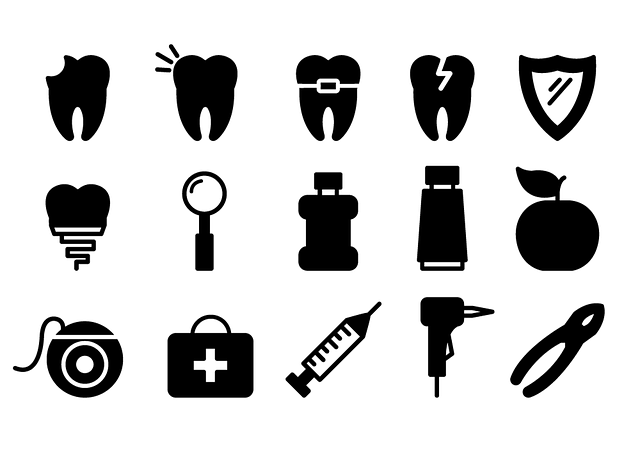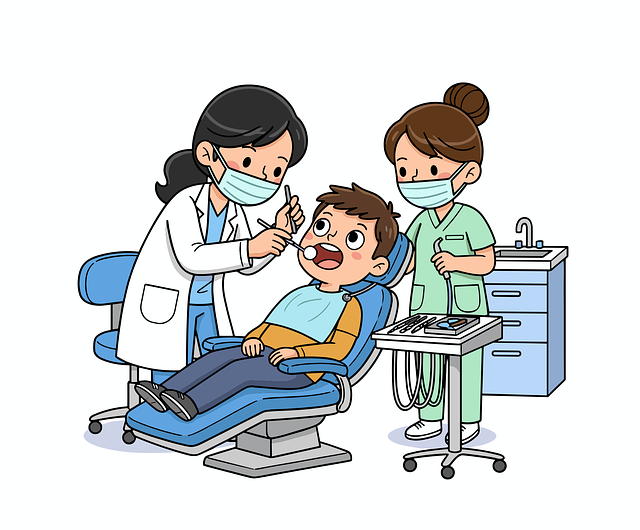Dr. Cazares: Revolutionizing Dental Care in McAllen with DDS

DDS McAllen Naturally offers comprehensive, affordable dental care in McAllen, Texas. Led by Dr. Caz…….
In an era where data is a powerful asset, ‘DDS McCallen’ has emerged as a revolutionary concept, transforming the way we manage and share information. This comprehensive guide aims to explore every facet of DDS McCallen, from its foundational principles to its global impact. We will delve into its historical development, uncover its core benefits, and analyze its economic, technological, and policy implications. Additionally, real-world case studies will highlight successful implementations, while a future outlook will predict the direction of this innovative data management system. By the end of this article, readers will have a profound understanding of DDS McCallen and its potential to reshape industries worldwide.
Definition:
DDS (Decentralized Data System) McCallen is a groundbreaking approach to data management that leverages blockchain technology and distributed systems to create a secure, transparent, and user-controlled environment for sharing and accessing data. It was inspired by the principles of decentralization, peer-to-peer networks, and open-source collaboration, aiming to address the limitations of traditional centralized data storage.
Core Components:
Decentralization: Data is stored across multiple nodes in a network, eliminating the need for a central authority. This ensures no single point of failure and enhances data security.
Blockchain Integration: A blockchain serves as the underlying infrastructure, providing an immutable and transparent ledger for recording data transactions. Smart contracts enable automated execution of agreements and access control.
Data Governance: Users have full control over their data, including ownership and sharing permissions. This is achieved through a decentralized identity system, allowing users to manage their digital identities securely.
Interoperability: DDS McCallen promotes seamless data exchange between different systems and platforms by establishing standardized protocols and APIs (Application Programming Interfaces).
Historical Context:
The concept of decentralized data systems gained traction in the mid-2010s with the rise of blockchain technology, particularly following the launch of Bitcoin. Early enthusiasts recognized the potential for a more democratic and secure data management system. Over time, various initiatives evolved, leading to the birth of DDS McCallen as a comprehensive framework that addresses numerous challenges in data sharing and governance.
Significance:
DDS McCallen holds immense significance in today’s data-driven world due to several key factors:
International Adoption:
DDS McCallen has garnered attention worldwide, with regions like North America, Europe, and Asia-Pacific leading the charge in implementation and research. The concept resonates particularly well in areas where data privacy is a paramount concern, such as the European Union (with its GDPR regulations) and various Asian countries with strong digital economies.
Regional Trends:
North America: This region has witnessed early adoption, especially in financial services and healthcare, driven by robust regulatory frameworks and advanced technological capabilities.
Europe: The EU’s focus on data sovereignty and privacy has fueled interest in DDS McCallen. Countries like Germany and the Netherlands are at the forefront of pilot projects.
Asia-Pacific: Countries like Singapore and Japan are exploring DDS McCallen for its potential to enhance digital identity systems and streamline cross-border data transfers.
Global Challenges:
Despite global enthusiasm, several challenges hinder widespread adoption:
Market Dynamics:
The market for decentralized data management solutions is experiencing rapid growth, driven by the increasing demand for secure and transparent data handling. According to a recent report by Grand View Research, the global blockchain data market size was valued at USD 5.7 billion in 2021 and is expected to expand at a CAGR of 48.6% from 2022 to 2030.
Investment Patterns:
Venture capital (VC) firms have shown significant interest in startups building DDS-related technologies. In 2022, global VC funding for blockchain and decentralized applications (DApps) reached a record high of USD 24.5 billion, with a substantial portion allocated to data management solutions.
Economic Impact:
Cost Savings: Organizations can reduce operational costs associated with traditional data storage and management systems by adopting DDS McCallen.
New Business Models: Decentralized data sharing enables innovative business models, such as data marketplaces, where users can monetize their data securely.
Job Creation: The development and maintenance of decentralized networks require skilled professionals, fostering employment opportunities in the tech sector.
Role in Economic Systems:
DDS McCallen has the potential to revolutionize various economic sectors:
Blockchain Innovations:
Data Management Technologies:
Future Potential:
Key Policies and Frameworks:
GDPR (General Data Protection Regulation): The EU’s GDPR sets stringent rules for data protection, giving citizens more control over their personal data, which aligns well with the principles of DDS McCallen.
CALPA (California Consumer Privacy Act): This California law grants consumers extensive rights to their personal information and requires businesses to disclose data practices, impacting how companies handle customer data.
National Blockchain Strategies: Several countries have developed or are developing national blockchain strategies, providing guidelines for the adoption and regulation of blockchain technology, including decentralized data systems.
Regulatory Challenges:
Potential Solutions:
Main Challenges:
Scalability: Blockchain technology, despite its capabilities, faces scalability issues, particularly in terms of transaction speed and network capacity.
Interoperability Barriers: While interoperability is a goal, achieving seamless data exchange between different blockchain platforms remains challenging due to varying protocols and standards.
User Experience: The complexity of interacting with decentralized systems can be a hurdle for regular users, requiring intuitive interfaces and user-friendly design.
Criticisms and Proposed Solutions:
Centralization Concerns: Some critics argue that DDS McCallen still relies on centralized entities (e.g., node operators) for certain functions. To address this, decentralized governance models and community-driven decision-making processes can be implemented.
Regulatory Uncertainty: As mentioned earlier, regulatory frameworks are evolving, creating uncertainty. Industry associations and thought leaders should engage with policymakers to provide clarity and promote best practices.
Security Risks: Despite blockchain’s security advantages, decentralized systems are not immune to cyberattacks. Continuous research and development in secure coding practices and smart contract audits are essential.
Case Study 1: Healthcare Data Sharing (Hyperledger Fabric)
A consortium of healthcare providers in the US implemented a Hyperledger Fabric-based DDS system to securely share patient data. This initiative improved inter-hospital communication, enabled faster diagnosis, and enhanced patient privacy by giving patients control over their medical records. The project received praise for its ability to streamline complex data sharing processes while maintaining security and compliance with HIPAA (Health Insurance Portability and Accountability Act) regulations.
Case Study 2: Supply Chain Transparency (Ethereum)
A global logistics company used Ethereum blockchain to create a transparent supply chain tracking system. By recording each step of the journey, from manufacturing to delivery, the company increased transparency, reduced fraud, and improved customer satisfaction. This case highlights how DDS McCallen can revolutionize supply chain management by providing an immutable audit trail.
Case Study 3: Digital Identity Verification (Sovrin Network)
Sovrin Network is a decentralized identity platform that enables individuals to control their digital identities across multiple online services. A financial institution in Europe adopted Sovrin to verify customer identities, reducing the risk of fraud and streamlining the onboarding process. This use case demonstrates the potential of DDS McCallen to enhance data privacy and user experience in various industries.
Emerging Trends:
Web3 Integration: The convergence of Web2 and Web3 technologies, including decentralized finance (DeFi), non-fungible tokens (NFTs), and DDS McCallen, will shape the future of digital interactions.
Decentralized Cloud Storage: As cloud computing becomes more prevalent, combining it with decentralized storage solutions can offer enhanced security, privacy, and cost savings for businesses and individuals.
Cross-Blockchain Interoperability: Efforts to enable seamless data transfer between different blockchains will gain momentum, fostering a more unified digital ecosystem.
Growth Areas:
Government Services: Decentralized systems can revolutionize government service delivery by enhancing transparency, security, and accessibility for citizens.
Financial Inclusion: DDS McCallen has the potential to provide financial services to the unbanked and underbanked populations by facilitating secure digital transactions and identity verification.
Digital Twins: Creating virtual representations of physical assets (e.g., cities, factories) using blockchain-based data management can enable efficient resource allocation and improved decision-making.
Strategic Considerations:
DDS McCallen represents a significant leap forward in data management, offering a more secure, transparent, and user-centric approach. Its global impact is already evident across various sectors, from healthcare and finance to supply chain management and digital identity. As the technology matures, we can expect even greater transformations in how data is shared, managed, and monetized.
The future of DDS McCallen looks promising, with ongoing innovations, growing adoption, and supportive policy environments. However, addressing technical challenges, ensuring regulatory clarity, and fostering public trust will be crucial for its widespread success. As the world navigates this new era of decentralized data management, DDS McCallen is poised to become a cornerstone of our digital future.
Q: How does DDS McCallen ensure data security?
A: DDS McCallen leverages blockchain technology, which provides a secure and transparent environment for data transactions. Smart contracts enforce access controls, and the distributed nature of the network makes it highly resistant to cyberattacks. Additionally, users have control over their private keys, ensuring they remain the ultimate guardians of their data.
Q: Can DDS McCallen replace traditional databases?
A: While DDS McCallen offers numerous advantages, it may not entirely replace traditional databases. Traditional systems are optimized for specific use cases, and some applications might require centralized storage for performance reasons. However, for data-sharing and governance scenarios, DDS McCallen provides a powerful alternative.
Q: What are the potential costs of implementing DDS McCallen?
A: The initial setup costs can vary depending on the complexity of the project and the chosen technology stack. However, over time, decentralized systems can lead to cost savings by reducing operational expenses associated with traditional data centers and management infrastructure. Additionally, the ability to monetize data through markets can generate new revenue streams.
Q: How does DDS McCallen handle data privacy concerns?
A: Data privacy is a core principle of DDS McCallen. Users have full control over their data, including access permissions. Blockchain’s immutable ledger ensures that once data is recorded, it cannot be altered or deleted, preserving privacy and preventing unauthorized access.
Q: Are there any regulatory risks associated with adopting DDS McCallen?
A: As with any new technology, there are regulatory considerations. However, the benefits of DDS McCallen align well with global data protection trends, such as GDPR. Industry players should stay informed about evolving regulations and collaborate with regulators to ensure compliance while leveraging the technology’s advantages.

DDS McAllen Naturally offers comprehensive, affordable dental care in McAllen, Texas. Led by Dr. Caz…….

McAllen residents can access top-tier dental care at reasonable rates through the local DDS McAllen…….

In today’s digital age, a strong online reputation is more than just a nice-to-have—it’s a competi…….

DDS McAllen offers comprehensive dental care with a focus on personalized, family-like treatment. Th…….

DDS McAllen offers personalized dentistry, prioritizing individual patient needs for optimal oral he…….

In the dynamic landscape of healthcare, where every second counts, emergency appointments play a vit…….

DDS McAllen offers personalized, patient-centric dental care at 1632 N. 10th Street. They employ adv…….

In the vibrant landscape of dental care, where a healthy smile is paramount, DDS McAllen emerges as…….

DDS McAllen Naturally focuses on enhancing oral aesthetics through preventive and cosmetic dentistry…….

In today’s healthcare landscape, access to financing options is a significant concern for uninsured…….